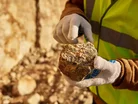Pandora’s Box: Mining the Pacific

Forget statistics—here’s the story of the Solomon Islands. A once-unscarred landscape, the tiny territory now suffers from oil and bauxite spilling into islander fishing grounds. While Rio Tinto, a foreign firm, built the mine, it now pays nothing to the government. According to the Guardian, this isn’t news. Each year, Pacific mining companies extract almost 11 million tonnes of oil and fuel, 2 million tonnes of metals such as copper, nickel, manganese, and aluminium, and US$2.6bn in gold.
As a result, the world is growing rich from the Pacific’s natural resources. At first, small island nations reaped some of the profits. In the 70s and 80s, Nauru—a microstate in Oceania—boasted one of the highest per capita global incomes. But over the years, these royalties served as a double-edged sword, triggering the collapse of the nation’s economy and rendering its land unlivable.
Blessing or Curse?
On Bougainville, one of Papua New Guinea’s (PNG’s) islands, a gold and copper mine once handsomely supported both the islanders and its corporate owner. At one point in its history, the Panguna mine made up 45% of PNG’s exports. In 17 years, the mine gave more than its share: in its final year, it extracted 550,000 tonnes of copper and 450,000 ounces of gold. But Panguna failed to deliver on its promise of wealth for islanders.
Instead of profits, small communities faced violence, stripped lands, and strife in their communities over how to regain their former ways of life. Less than 1% of the Panguna profits ever made it to their pockets. Eventually, realising that its foreign owners were the prime beneficiaries of its wealth, the community rose up and fought to close the mine.
This rebellion was a small action that fueled a decades-long civil war. By the time of the cease-fire, the fighting killed more than 15,000 civilians. The company that bankrolled Panguna, Rio Tinto, abandoned the site in 1989—claiming the area was no longer safe for its stakeholders.
The Balancing Act
According to Paul Barker, PNG’s Institute of National Affairs Director, island nations rich in natural resources must walk the tricky line between profits and personal wellbeing. But that’s not their burden alone. “It’s society’s responsibility—including government and the mining industry—to manage [extractive industries] to minimise negative impacts”, he said. “[We must] apply minimum standards...and mark some places as off-limits”.
While he acknowledges that Papua New Guinea should try to rely on local mining corporations to handle its natural resources, globalisation is only speeding up. Multinationals often offer attractive remuneration coupled with heavy-handed pressure. “[Papua New Guinea] has learned a lot of lessons from mistakes”, he said. All will come in useful in the future.
With more PNG mines soon to come, it doesn’t look as if the islanders will be able to put mining back into Pandora’s box. In Lae, we’ll see the opening of the nation’s first coal mine; in Sepik, village councils have once again been cowed into submission by companies planning PNG’s biggest gold and copper mine. The planned mines currently carry a risk of “catastrophic loss of life and environmental destruction”, according to the United Nations.
Money talks. But with multinationals paying increased attention to the environmental, human rights, and governance risks within their supply chains, mining companies may be the ones to try to reform the very methods they’ve used and profited from for so long.
Mining in the Pacific might never stop—but there’s still time to make it more equitable
- How is Anglo American Enhancing Mining Safety?Operations
- Anglo American and Teck: Forming a Global Minerals GiantSupply Chain & Operations
- Maaden Appoints Donovan Waller to Lead Mining Tech FutureTechnology
- The Future of Mining? Rio Tinto’s Game-Changing RestructureSupply Chain & Operations



